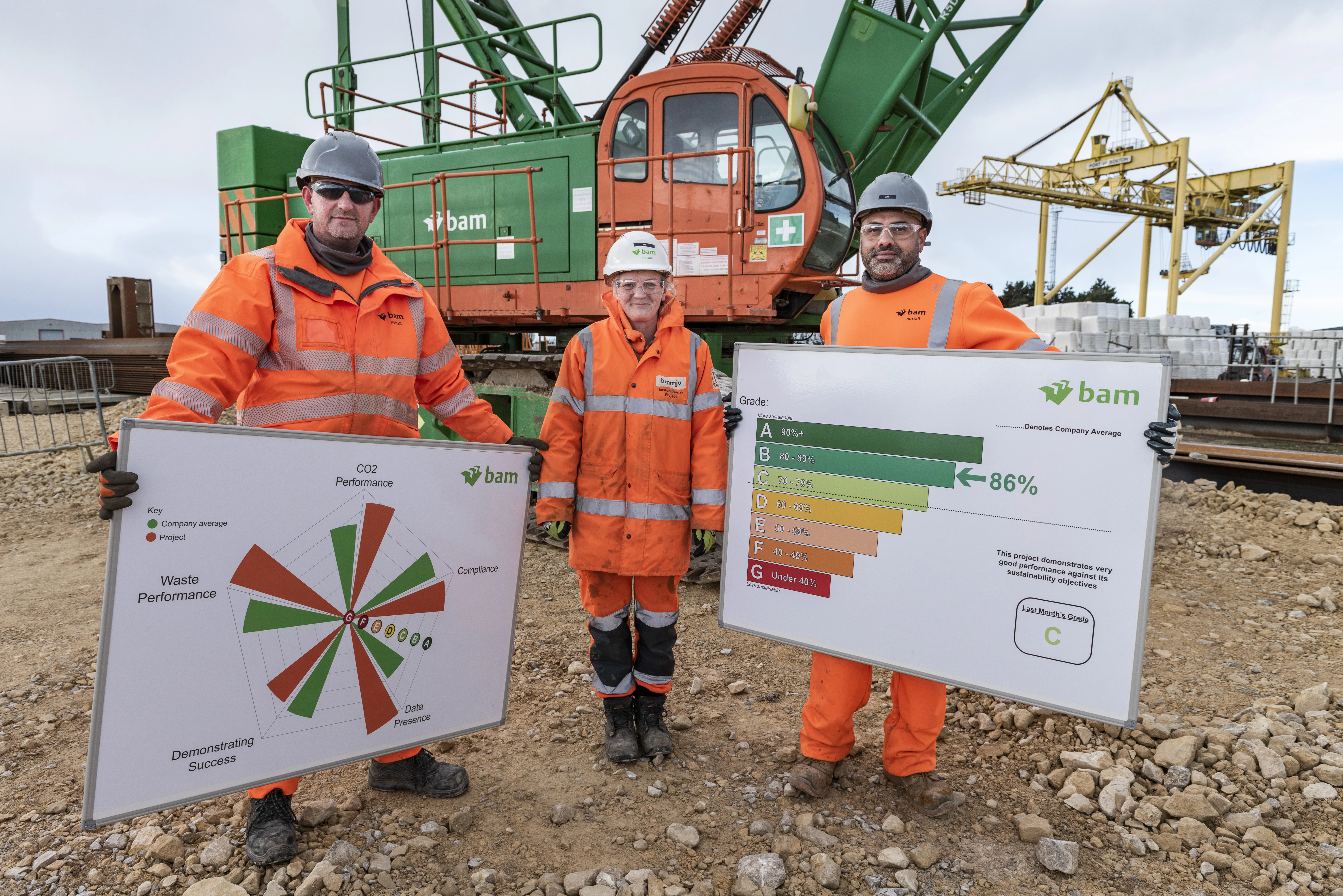
BAM accelerates net zero carbon targets
BAM’s UK & Ireland businesses have set an ambitious carbon target to become net zero in their direct operations by 2026. It is ruling out counting electricity from green energy tariffs towards its net zero emissions.
The target places BAM at the forefront of the UK and Ireland’s construction sector’s major contractors. It builds upon Royal BAM Group’s target to reduce its direct emissions intensity by 80 per cent by 2026 from 2015 levels. The company is committed to openness and not relying heavily on carbon offsets which it believes can disguise more substantial progress in how a company is acting.
BAM’s UK & Ireland net zero commitment encompasses not just direct scope 1 and scope 2 emissions (associated with fuels and energy use), but also select scope 3 emissions, going further than most net zero carbon targets in the sector.
BAM’s scope 3 emissions include water consumption, staff transport (across road, rail and air), emissions arising from using hotels, emissions from third party fuel and energy use and all well-to-tank (upstream) emissions associated with scope 1 and scope 2 emissions. The company says it has significant influence over all these emissions sources.
BAM becomes the only company in the sector at present not to count its purchase of renewable (REGO-backed) electricity towards zero emissions. Any remaining emissions from 2026 will be offset using high quality nature-based solutions such as re-forestation, or carbon capture technologies.
John Wilkinson, chief operating officer of BAM UK & Ireland, said: “Net zero carbon is the objective we are all seeking because the construction sector still accounts for 39 per cent of all global emissions. We have a serious job on our hands to get that down and to do so fast.
“That’s why we have chosen to accelerate our progress and we are not fooled that we will be alone. The whole industry needs to challenge itself, work together, and assist its clients and supply chain to make faster progress too.”
The vast majority of the company’s direct energy procurement already uses REGO-backed energy contracts (Renewable Energy Guarantee of origin certificates issues by Ofgem on behalf of the UK Government) and whilst it could use these to claim that it is zero carbon, BAM believes that it should seek to reduce the real emissions from grid electricity usage.
BAM is supporting the drive towards building more renewable energy generation through the delivery of schemes such as the SSE substations framework in Scotland which directly links to renewable generation.
BAM’s Carbon Reduction Lead, Sarah Jolliffe, added: “We are on a journey here – we have already reduced our emissions intensity by 20% this year compared to the same period last year, mitigating the release of 7 kilotons of carbon.
“We have worked with the Carbon Trust on measuring scope 3 emissions and our FM business has helped pioneer Scope 3 measurement in the facilities management sector working with the SFMI (The Sustainable FM Index). These kinds of collaborations are crucial as we explore more ways to work with our supply chain and clients to decarbonise the built environment.”
By Mark Adair – Correspondent, Bdaily
- Add me on LinkedIn and Twitter to keep up to date
- And follow Bdaily on Facebook, Twitter and LinkedIn
- Submit press releases to editor@bdaily.co.uk for consideration
Looking to promote your product/service to SME businesses in your region? Find out how Bdaily can help →




 test article 123456789
test article 123456789
 hmcmh89cg45mh98-cg45hm89-
hmcmh89cg45mh98-cg45hm89-
 test456456456456456456
test456456456456456456
 test123123123123123123
test123123123123123123
 test xxxdiosphfjpodskhfiuodsh
test xxxdiosphfjpodskhfiuodsh
 Savour the flavour: North Tyneside Restaurant Week returns for 2024
Savour the flavour: North Tyneside Restaurant Week returns for 2024
 Six steps to finding the right buyer for your business
Six steps to finding the right buyer for your business
 Stephen signs off on a special night
Stephen signs off on a special night
 Life’s a Peachaus: Gillian Ridley Whittle
Life’s a Peachaus: Gillian Ridley Whittle
 Making a splash: Phil Groom
Making a splash: Phil Groom
 Making workplace wellbeing a priority
Making workplace wellbeing a priority
 A record of delivery, a promise of more: Ben Houchen
A record of delivery, a promise of more: Ben Houchen